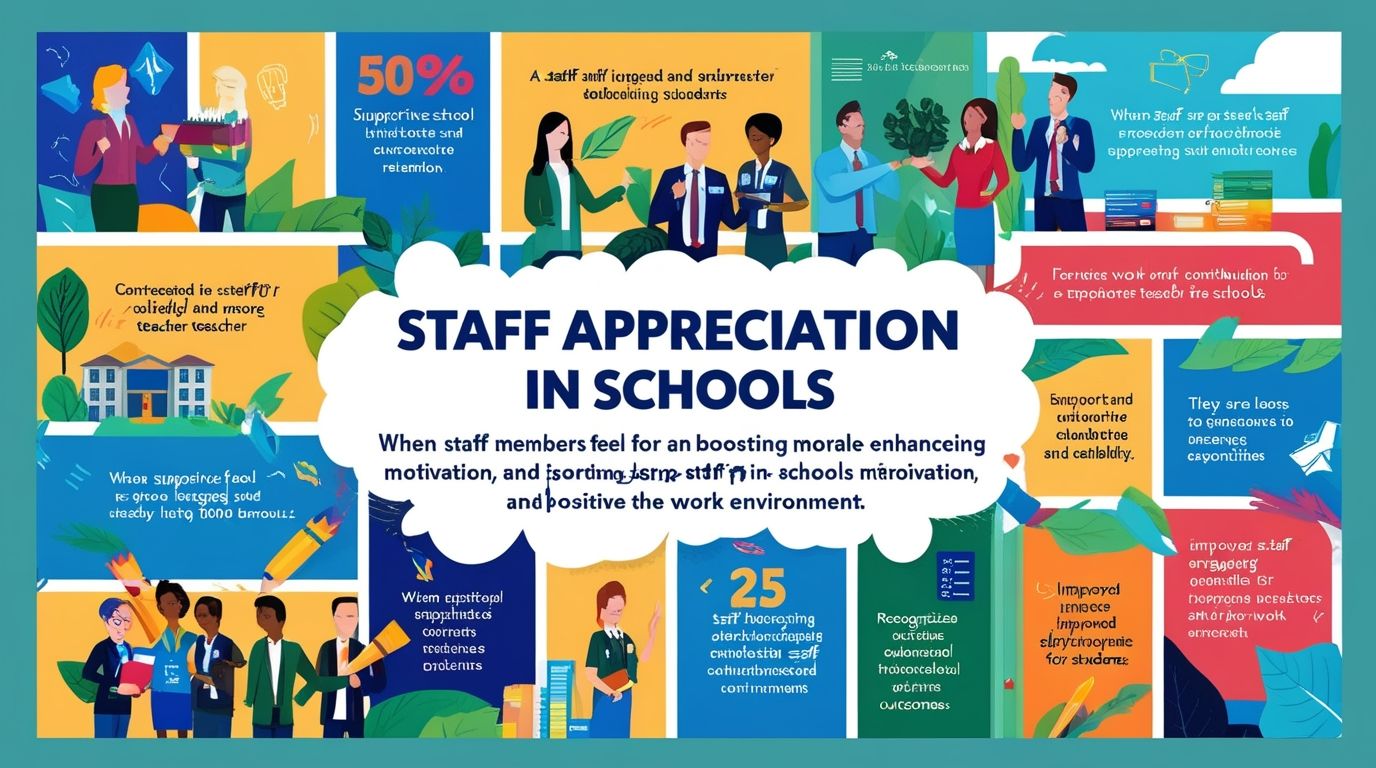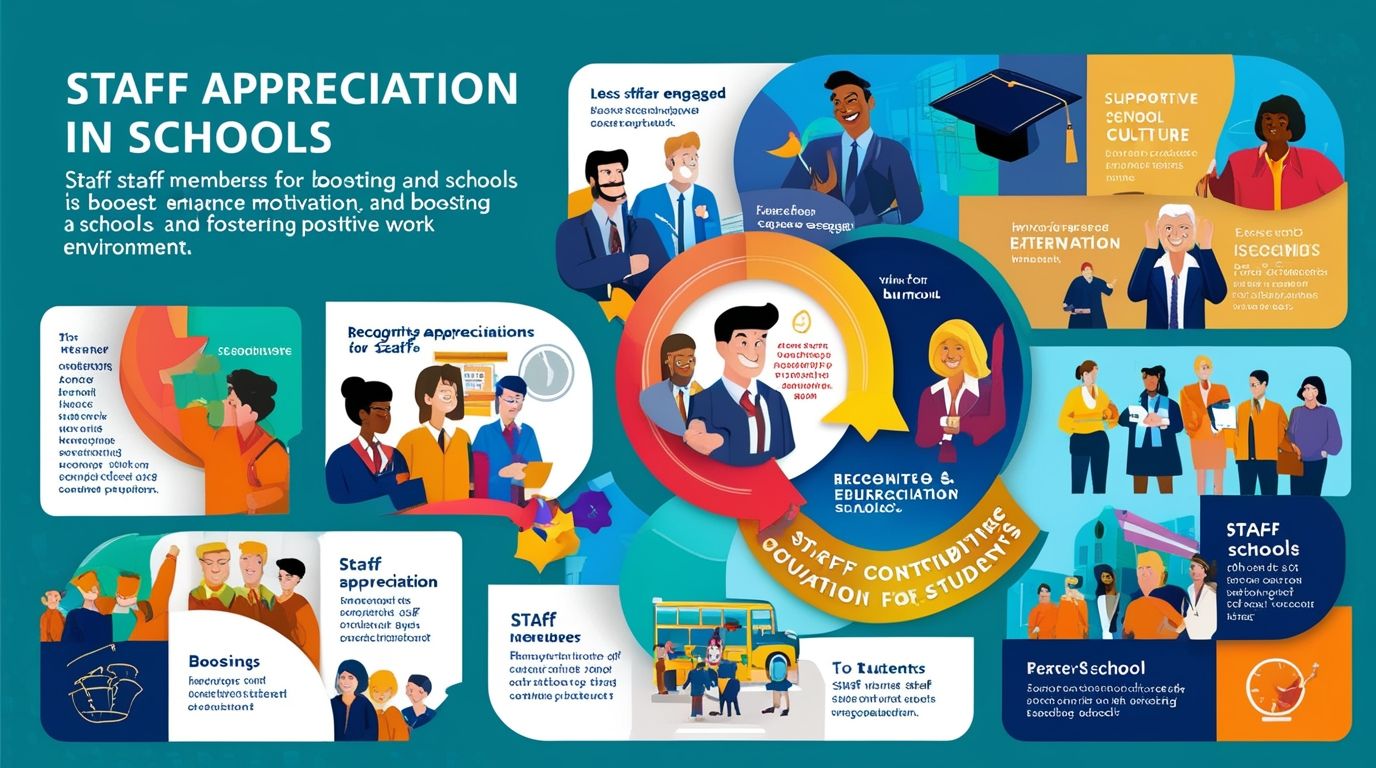Introduction
The Impact of Staff Appreciation in a School r Staff appreciation in schools is an often overlooked but profoundly important aspect of educational management. While much focus is placed on student achievement and curriculum development, the well-being and morale of the staff who drive these outcomes are equally crucial. The impact of staff appreciation in a school setting extends beyond simple recognition; it fosters a positive school culture, enhances teacher retention, and ultimately contributes to the overall success of the school. This article explores the various dimensions of staff appreciation in schools, its benefits, and how it can effectively implemented.
The Importance of Staff Appreciation
1. Enhancing Morale and Motivation
One of the most immediate impacts of staff appreciation is the boost in morale and motivation among teachers and support staff. Schools can be challenging work environments, with high demands and limited resources. When staff members feel appreciated, they are more likely to remain motivated and committed to their roles, despite the challenges. Appreciation validates their efforts, making them feel valued and respected. This positive reinforcement encourages staff to continue striving for excellence in their work.
2. Promoting a Positive School Culture
A culture of appreciation within a school can significantly enhance the overall environment. When staff members recognized for their contributions, it fosters a sense of belonging and community. This positive culture not only improves relationships among staff but also between staff and students. When teachers and support staff feel valued, they are more likely to contribute positively to the school environment, which in turn creates a more supportive and encouraging atmosphere for students.
3. Reducing Burnout and Turnover
Teacher burnout and high turnover rates are persistent issues in education. Staff appreciation plays a crucial role in mitigating these problems. When teachers feel undervalued, they are more likely to experience burnout and consider leaving the profession. Conversely, regular recognition and appreciation can reduce feelings of stress and isolation, providing emotional support that helps teachers cope with the demands of their job. This can lead to increased job satisfaction and a lower likelihood of turnover.
4. Enhancing Professional Growth
Appreciation can also drive professional growth by encouraging staff to pursue further development. When teachers and other school staff feel recognized for their efforts, they are more likely to engage in continuous learning and professional development. This can lead to improved teaching practices, innovative approaches to student engagement, and overall better educational outcomes. Schools that prioritize staff appreciation often see a culture of continuous improvement, where staff members are eager to grow and enhance their skills.
5. Impact on Student Outcomes
The impact of staff appreciation extends to students as well. When teachers are appreciated and feel good about their work, it reflects in their teaching. Motivated and satisfied teachers are more likely to be engaged, enthusiastic, and innovative in their approach to education. This positively influences student engagement, academic performance, and overall well-being. A school environment where staff appreciation is a priority often results in a more positive and productive learning environment for students.

Effective Strategies for Staff Appreciation
1. Regular and Sincere Recognition
Regular and sincere recognition is one of the most effective strategies for staff appreciation. This can be as simple as a verbal acknowledgment of a job well done, a thank-you note, or a shout-out during staff meetings. The key is to ensure that the recognition is specific, timely, and sincere. Generic or delayed recognition can sometimes feel insincere and may not have the desired impact. Recognizing the unique contributions of each staff member shows that their work noticed and valued.
2. Professional Development Opportunities
Providing opportunities for professional development is another powerful form of appreciation. By investing in the growth and development of staff members, schools demonstrate that they value their staff’s contributions and committed to their ongoing success. This can include offering workshops, training sessions, or opportunities to attend conferences. Supporting professional development not only enhances staff skills but also shows appreciation for their dedication to the profession.
3. Celebrating Milestones and Achievements
Celebrating milestones and achievements is another effective way to show appreciation. This can include recognizing years of service, acknowledging significant accomplishments, or celebrating personal milestones such as birthdays or anniversaries. These celebrations can be formal, such as an awards ceremony, or informal, like a staff lunch or gathering. The goal is to create a sense of community and shared success, where staff members feel appreciated for their contributions over time.
4. Providing a Supportive Work Environment
A supportive work environment is a critical aspect of staff appreciation. This includes ensuring that staff members have the resources they need to do their jobs effectively, such as adequate classroom supplies, access to technology, and a manageable workload. It also means providing emotional support, such as offering counseling services or creating opportunities for staff to connect and share their experiences. A supportive work environment shows that the school values not only the work of its staff but also their well-being.
5. Offering Incentives and Rewards
Incentives and rewards can also be effective in showing appreciation. This can include financial incentives, such as bonuses or salary increases, as well as non-monetary rewards like extra vacation days, gift cards, or special privileges. While these incentives should not replace regular recognition and appreciation, they can be a powerful way to acknowledge exceptional effort and dedication. Offering rewards shows that the school is willing to invest in its staff and recognizes the importance of their contributions.
Challenges and Considerations
While staff appreciation is important, it is not without its challenges. One of the main challenges is ensuring that appreciation efforts are consistent and equitable. It is important that all staff members feel valued, regardless of their role or position within the school. This means recognizing the contributions of not only teachers but also support staff, administrative personnel, and other members of the school community.
Another challenge is avoiding the perception of favoritism. Staff appreciation efforts should be inclusive and transparent to ensure that all staff members feel equally valued. This can be achieved by establishing clear criteria for recognition and ensuring that appreciation efforts are communicated openly.
Finally, it is important to ensure that staff appreciation efforts are genuine and not just a box-ticking exercise. If staff members feel that appreciation efforts are insincere or superficial, it can have the opposite effect, leading to disengagement and resentment. Schools should focus on creating a culture of appreciation that is embedded in everyday interactions and not just reserved for special occasions.
Conclusion
The impact of staff appreciation in a school setting is profound and far-reaching. When staff members feel valued and appreciated, it leads to higher morale, reduced burnout, and increased motivation. This, in turn, contributes to a positive school culture, enhanced professional growth, and improved student outcomes. By implementing effective strategies for staff appreciation, schools can create an environment where all staff members feel valued and supported, leading to greater overall success.
In an era where educational challenges are increasingly complex, the importance of recognizing and appreciating the contributions of school staff cannot be overstated. Schools that prioritize staff appreciation are not only investing in the well-being of their staff but are also setting the foundation for a thriving educational environment where both staff and students can excel.

6 thoughts on “The Impact of Staff Appreciation in a School”
Comments are closed.